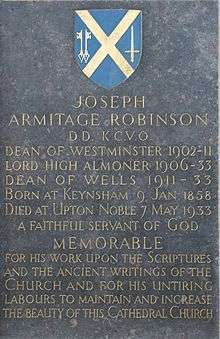Armitage Robinson

As depicted by "Spy" (Leslie Ward) in Vanity Fair, December 1905

Joseph Armitage Robinson, KCVO, FBA, DD (9 January 1858 – 7 May 1933) was a priest in the Church of England and scholar. He was successively Dean of Westminster (1902–1911) and of Wells (1911–1933).
Biography
Born the son of a poor vicar in Keynsham, Robinson was educated at Liverpool College and Christ's College, Cambridge of which he became a Fellow.[1] Vicar of All Saints' Church, Cambridge 1888 - 1892. In January 1902 he was appointed a Chaplain-in-Ordinary to King Edward VII,[2] and shortly thereafter Dean of Westminster, in which position he served until he was appointed Dean of Wells in 1911. It has been suggested that the move to Wells was arranged to avoid friction in the run-up to the coronation of George V.
Robinson was Lord High Almoner from 1906 to 1933.
As Dean of Wells Robinson enjoyed close links with Downside Abbey. He also critically explored the origins of the Glastonbury legends to which the Glastonbury Festival had revived attention. A renowned scholar in patristics (he was particularly known for his work on the Lausiac History and for having been the first person to translate into English the newly discovered work by Irenaeus The Demonstration of the Apostolic Preaching), Armitage Robinson was a participant in the bilateral Anglican-Roman Catholic Malines Conversations. He held honorary doctorates from Göttingen and Halle.
He was appointed Knight Commander of the Royal Victorian Order in 1932, and died on 7 May 1933.
Works
- Encyclopaedia Biblica (contributor), 1903.
- St. Paul's Epistle to the Ephesians, A revised text and translation with exposition and notes London 1903, Second Edition 1904.
- The Lausiac History of Palladius (Texts and Studies, vol. vi),Cambridge 1904.
- (with Cuthbert Butler) The Lausiac History of Palladius, 1918.
- The Demonstration of the Apostolic Preaching (translated from the Armenian with introduction and notes), 1920
- The Saxon Bishops of Wells, London, 1919.
- Somerset Historical Essays, Oxford,1921.
- The Times of St. Dunstan, Oxford, 1923.
- Two Glastonbury Legends: King Arthur and Joseph of Arimathaea, Cambridge 1926. Reprinted in 2010 by Kessinger Publishing, LLC. ISBN 978-1-169-68948-0
References
| Wikisource has original works written by or about: Armitage Robinson |
- ↑ "Robinson, Joseph Armitage (RBN877JA2)". A Cambridge Alumni Database. University of Cambridge.
- ↑ "No. 27393". The London Gazette. 3 January 1902. p. 1.
- Taylor, T. F. (1991). J. Armitage Robinson. Cambridge: James Clarke. pp. 144 pp. ISBN 0-227-67913-X. OCLC 25632121.
- Creed, John Martin (193?). Joseph Armitage Robinson, 1858–1933. From the proceedings of the British Academy. Volume XX. London: Milford. pp. 14 p., 27 cm. OCLC 24684382. Check date values in:
|year=(help) - Canadian Press (May 9, 1933). "Dr. Robinson Dead; Ex-Dean of Wells; Dared to Cross Opinions With Late King Edward Over Plans for Coronation". The New York Times. p. 17. Retrieved 2008-07-21.
- Taylor, T. F. (September 2008) [2004]. "Robinson, Joseph Armitage (1858–1933)". Oxford Dictionary of National Biography. Oxford University Press. doi:10.1093/ref:odnb/35797. Retrieved 4 November 2009.
| Religious titles | ||
|---|---|---|
| Preceded by George Granville Bradley |
Dean of Westminster 1902–1911 |
Succeeded by Herbert Edward Ryle |
| Preceded by Thomas Jex-Blake |
Dean of Wells 1911–1933 |
Succeeded by Richard Malden |
